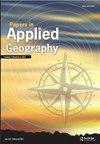Calculating Mexico City’s Food Supply: Methodological Insights for Regionalizing Food Data at the Urban Scale
Q2 Social Sciences
引用次数: 2
Abstract
Abstract Tackling the environmental impacts of food systems can play a crucial role in achieving urban sustainability. Robust accounts of urban food supply must inform policymaking. Current research on urban food supply often relies on extrapolating national data sets to the urban scale, obscuring the diversity of food consumption patterns across regions and across the urban–rural divide within countries. One illustration of this is the case of Mexico, where biocultural diversity has shaped diverse diets across the country. In this article, we present a method to estimate urban food supply in the data-scarce context of Mexico City. We combine national data on food supply with food consumption data from a spatially explicit food questionnaire to estimate urban food supply. We estimate the food supply for the Mexico City Metropolitan Area, breaking it down by food group, and present key differences with national-scale data. In particular, consumption of animal products (meat and milk) is higher than the national average, and corn consumption is lower. We conclude that it is crucial to produce precise accounts of urban diets to enable robust analyses of the environmental impacts of urban food supply, and reflect on the limitations and opportunities of our method.计算墨西哥城的食物供应:城市尺度上食物数据区域化的方法学见解
解决粮食系统对环境的影响对于实现城市可持续发展至关重要。城市食品供应的可靠数据必须为政策制定提供依据。目前关于城市粮食供应的研究往往依赖于将国家数据集外推到城市规模,从而模糊了各国内部不同区域和城乡之间粮食消费模式的多样性。这方面的一个例子是墨西哥,在那里,生物文化多样性塑造了全国各地不同的饮食。在这篇文章中,我们提出了一种在墨西哥城数据稀缺的背景下估计城市食品供应的方法。我们将国家食品供应数据与来自空间明确食品问卷的食品消费数据相结合,以估计城市食品供应。我们估计了墨西哥城大都市区的食物供应,按食物组进行了分类,并提出了与国家规模数据的关键差异。特别是,动物产品(肉和奶)的消费量高于全国平均水平,玉米消费量较低。我们得出的结论是,对城市饮食进行精确的描述是至关重要的,这样才能对城市食物供应对环境的影响进行强有力的分析,并反思我们方法的局限性和机遇。
本文章由计算机程序翻译,如有差异,请以英文原文为准。
求助全文
约1分钟内获得全文
求助全文

 求助内容:
求助内容: 应助结果提醒方式:
应助结果提醒方式:


